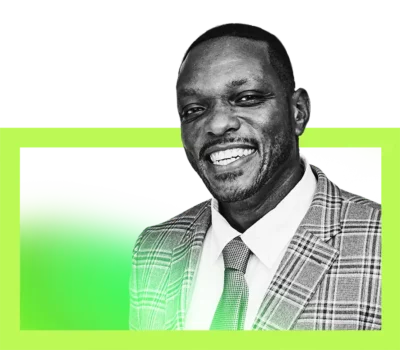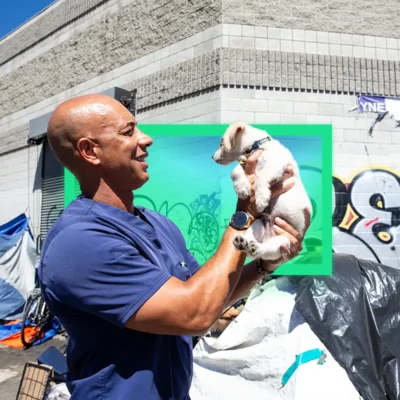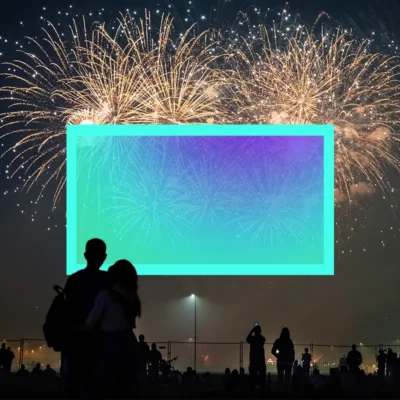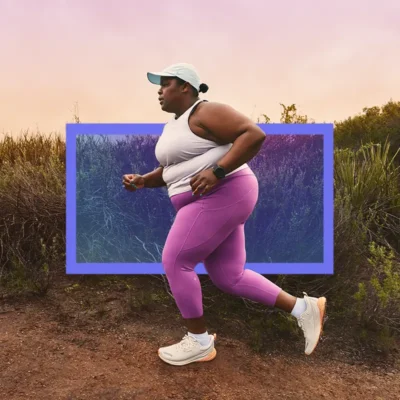Changing the soundtrack of our lives
Jail has a way of warping time. Changes on the outside world are locked away from those inside. Upon his release after serving 17 locked-up years, Jule recounts the moment he first sets eyes on a smartphone. The prison noises he is escaping — the yelling, the constant blaring of the radio, metal-on-metal echoing of cell bars — are replaced by the incessant pings and notifications of his new iPhone. His novice observations about the technology we wrap our lives around reveal a truth that perhaps we can no longer see ourselves.
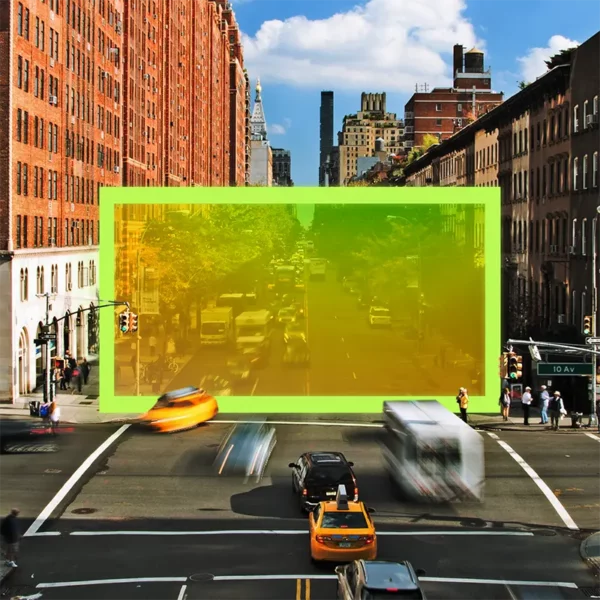
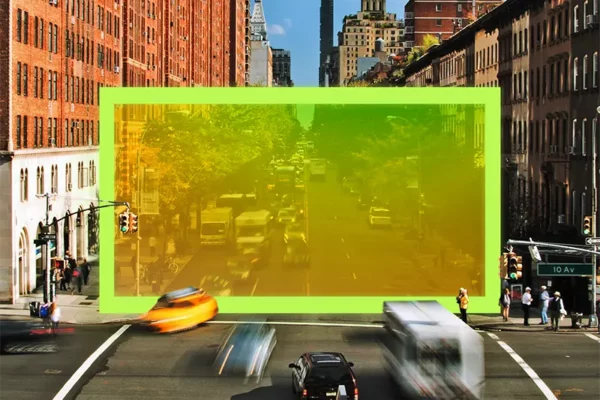
Table of Contents:
Transcript:
Changing the soundtrack of our lives
JULE HALL: One of the first facilities I’m in — Coxsackie Correctional Facility — has a small chapel. There are 10 rows of pews that maybe only sit four people. The light is soft. Dim. There are no statues like a traditional church or stained glass windows. But nonetheless, the smell of wood in this space calms me. It’s not a space that is completely quiet. The chaplain preaches and prison inmates sing the hymns. We bow our heads and we pray. I find myself sitting on the pew, the soothing smell of wood surrounds me, feeling relaxed maybe even dozing off. It’s a meditative space for me—a place where I know I’m safe. I can let my guard down.
ROHAN GUNATILLAKE: Jail has a way of warping time and space, with many changes on the outside world locked away from those inside. In today’s Meditative Story, Jule Hall recounts the moment he holds an iPhone in his hands, and with beginner’s eyes sees the profound effects of this technology in our lives in ways we instinctively know to be true, but perhaps can no longer see ourselves.
In this series, we blend immersive, first-person stories with mindfulness prompts to help slow your life down, just a bit. Just for a moment. From WaitWhat and Thrive Global, this is Meditative Story. I’m Rohan, and I’ll be your guide.
The body relaxed. The body breathing. Your senses open. Your mind open. Meeting the world.
HALL: The first noise I hear, at the start of daybreak, is the wake-up bell. It’s hard to keep track of time, but I’ve learned the bell usually tolls around 6 am. It’s a forceful and penetrating noise. It shakes me out of sleep. This bell tells me that the officers are making their rounds. Taking their count. Making sure no one has escaped.
In prison, different bells signal different times of the day. A roaring gong tells you to wake up – time for the officer to make his or her rounds. An eccentric bell means it’s time for chow. No matter how many times I hear them I don’t get used to them. Each one is a trigger, each notification peaks my anxiety.
A bell tolls that lets me know we are being escorted from our cells out into the open air. Once that sound occurs, there is this sense of, “Okay, I can step out of this confined space, this small space, and go to a more open, confined space where there is sunlight and air.”
One thing I wasn’t prepared for was just how noisy prison is. The facility is an open space. You can hear people yelling back and forth to one another between the floors. Radios are constantly playing. There’s always an echoing, the sound of people moving. You can never really escape it.
But there are some noises I begin to like, even look forward to. The noise at night when everyone is returning to their bunks, the cell blocks piled on top of one another; the shuffling, the footsteps, above and below me as my fellow inmates return from recreation or school or chow; the cascade of everyone locking their cells at the same time, like dominoes. The sounds of keys roll on for about two or three minutes, 80 to 100 cells. It’s a sound I appreciate. These are sounds that humans make. I’m human; I am part of a community.
It’s also a sign to me that quiet is coming as people start to fall asleep. That is a “noise” I welcome.
GUNATILLAKE: Such a powerful scene. Can you imagine being here with Jule here in this cell? Such a small space – yet connected. And close to peace.
HALL: During the early years of my incarceration, I put on headphones to cover the constant noise of prison with music. But I realize I am just replacing noise with noise. I need to find a way to exist in this environment but, at the same time, not get so mentally bankrupt by it.
I make learning a priority. I attend the church and the mosque. I like to examine various religions; to me they’re all different versions of essentially the same story. I discover East Indian philosophy, and I pick up meditation for the first time.
I come across a book that teaches me how to practice, how to breathe deep into the belly and out through the nostrils. I feel this sense of euphoria that rises up in my chest whenever I engage. I am able to expand this confined space. When I breathe and get into the rhythm, I am taken outside the prison walls.
One of the first facilities I’m in, Coxsackie Correctional Facility, has a small chapel. There are 10 rows of pews that maybe only sit four people. The light is soft, dim. There are no statues like a traditional church or stained-glass windows. But nonetheless, the smell of wood in this space calms me.
It’s not a space that is completely quiet. The chaplain preaches and prison inmates sing the hymns. We bow our heads and we pray. I find myself sitting on the pew, the soothing smell of wood surrounds me, feeling relaxed, maybe even dozing off. It’s a meditative space for me, a place where I know I’m safe. I can let my guard down. I start to see this practice change me from the inside out. I am calmer. I’m more at peace.
One morning, the cell doors open and two men immediately emerge and start running at one another. A fight breaks out. Violence produces a fight-or-flight response in people. A lot of people choose to fight. But I have this sudden sense of calm, this knowing that, “This has nothing to do with me.” I am not going to let it harden me. All I need to do is stand by myself, away from the scuffle. I tell myself: remain calm, breathe, allow whatever violence there is to occur outside of you.
I hear the officers yell, “Get back in your cells! Get back in your cells.” I am not roused. It’s the practice, I’m sure of it. It allows me to be exposed to violence and anxiety and screaming without a reaction, observing it without being inside it. Deep calm overtakes me.
GUNATILLAKE: Can you see Jule now? Still in the middle of all this chaos? What does his body look like? Can you bring some of that steadiness to your own posture?
HALL: I was incarcerated at 17 years old for a violent offense. I now have 21 years incarcerated without a single act of violence. I go before a board of five parole commissioners. They approve my release. Only 90 days stand between me and freedom.
I transfer to a new facility located in New York City. I receive what is called “outside clearance.” I have permission to go outside, clean sidewalks, and take the garbage out. I am not a flight risk because my release is imminent.
The first time I step outside on the sidewalk, motion sickness overwhelms me from all the cars whipping past. Cars disorient me. I push the garbage towards the compressor. A person walks past me who talks to themselves. People now have earphones that plug into their phones. This is completely new to me. I wonder why everyone is having conversations with themselves. I don’t realize yet how these devices take up so much space in everyone’s lives.
“I bought you a brand-new iPhone 6,” my aunt tells me. The 6 Plus, the newest iPhone at the time. It’s my first gift I receive when I leave prison. It feels beautiful to have this heavy, slim object in the palm of my hand. My fingers fold around the precious glass.
That night, in the quiet of my own room, I open the weather app. I like this app because it shows me the stars in the sky. I literally catch myself just staring at the pictures, the images of the weather, and the starry sky. I think, “Wow, this is so beautiful. This little device is just for me.” A window to the sky. I’m inside with a roof over my head but I can still see the stars.
GUNATILLAKE: The same stars are above you right now. You most likely can’t see them in this moment. But they’re right there. Sense them.
HALL: I am overwhelmed by how easily I have become attached to this slim device bursting with noises, how much anxiety rises up in me whenever I hear my phone going off and I immediately need to search for it.
I can be going to the bathroom and asking myself, “Where’s my phone?” It has become a… how would I describe it? An unfavorable companion, someone who I tolerate and always keep in my vicinity but I don’t really want to be there.
A lot of my coworkers have found a way to work with anxiety, to make the phone pull more productivity out of them. I, on the other hand, find myself triggered by the notifications and reminders for things that could easily be handled during the next work day. I constantly change the sounds of the notifications, hoping to find ones that don’t tense me up. Still, the notifications keep showing up.
Months after my release, my cousin dies. My aunt calls me. And then my other cousin joins the call. Soon enough, I’m thrust into a group call with four other family members. I’ve never experienced something like this before, where we can talk all at once. We’re being nostalgic, talking about the last time we saw my cousin, what he was doing, what we were doing. I feel the anxiety rise up in me, however, as the phone in my hand keeps vibrating. I’m trying to console my family members, say encouraging things, but there are so many interruptions. I’m not used to any of this. I’m used to someone knocking on my door if they needed me, or writing me a letter.
I hear this incessant buzzing going off in my ear as I try to focus on the conversation all happening at once. I pull the phone away from my face to check. It’s an email coming through, one after the other, after the other. Many emails….
“Okay,” I tell myself, “It’s just work. I’ll reply later.” I return to the call with my family.
But the click, click, click keeps coming and I can’t fully be present to the phone call. I don’t understand why it’s so important to send an email, never mind a dozen, on a day off. A person who hasn’t missed all this time by being incarcerated might tell their family, “Oh, I need to work late tonight because this project is important.” For me, my time is more serious – I haven’t been around my family for 22 years.
I am not comfortable putting work above love, above connection, because then I will lose out. My colleagues have already established love, respect, and affection in their families, I’m still working to reestablish these connections with my friends and loved ones. My weekends are precious to me. I talk, I flirt, I go out on dates. I will not work on the weekends.
My first Thanksgiving outside the prison walls is in upstate New York. I’m with my cousin, who is married, and her two daughters. I can still remember holding the oldest girl, Nalia, while in prison. She was so little. I’m home now though, and this little baby’s become a grown woman.
It feels so good to have this first Thanksgiving with family. We sit around the table eating our turkey and passing the cranberry sauce. There are collard greens and macaroni. When the food is cleared, we bring out a pecan pie and other desserts. I sit in this moment, with a cup of coffee in hand, and just savor the simplicity. There’s nothing so special about it but pecan pie and the coffee and the voices of my family – it’s all so perfect.
The adults are at one end of the table having adult conversations about the world and politics, that sort of stuff. I notice, out of the corner of my eye, my nieces have this way of being physically present at the table but with their phones in their laps, readily available. They pull out their phones and look at them.
So much of the family is happy to see me. I feel bombarded by questions and all the attention on me. But I keep shifting my attention back to my nieces. I’m asking them questions like, “What are you looking at? Who are you texting? Is that your boyfriend?” I want to engage them in conversation and cause them to not look at their phones.
They are laughing and giggling as we talk. I keep being pulled back into the adult conversation. They keep reverting back to their phones when the attention is off them. I don’t judge them; it just makes me want to engage with them more.
But here I am with this new generation who is quieter than my generation, perhaps because they have an entirely separate world of communication on their phones while they’re sitting here alongside me and our family. Their notifications and pings. Their world wrapped up in this device. But I want them to be a part of what’s happening at this table. They don’t care to be looped into the bigger conversation the way it matters to me. They’re okay with being absent, off in their own separate world, physically present at the table, but not really here with me, with us.
I guess it makes me feel a little sad. I’ve set the trend with some of my family to not pick up my phone so quickly when we hear it go off. We play this game of “Who will look at their phone first?” If it’s me, there’s this barrage of people saying, “Oh, you looked at your phone. You looked at your phone!” Even if it’s a silly game, it does the trick of getting people to put their phones down, to be with each other.
Today the noises around me are different from the years I spent in prison walls. I can hear the sound of cars outside my window. The hum of my refrigerator. The fan inside of an Xbox that whirs on to keep the system from overheating. I hear it hum when the system has been on for too long.
I am aware of these “noises.“ But I don’t consider them to be noises at all. The sound of an ambulance tearing through the neighborhood. The sound of children laughing as they play in the recreation area outside of where I work. My neighbor above me is wearing heels as she walks across the floor in the late hours. I welcome these noises. They are signals to me that I am no longer in prison. I am part of a new community.
Every morning, I have a routine. An attempt to ground myself in this day. I turn off my phone. I light a candle. I sit on my couch with a cup of coffee and begin to assess.
“Okay, you’re awake.
You’re here.
Thank God, you woke up today.
I’m so grateful for that.”
I have to be intentional to stay in this space. There are a million things grabbing at my attention. Little pings in my brain reminding me, “I have to call that person… Oh, you have to do that thing.” There is this pervasive pressure to be on.
But in this space, I breathe and tell myself, “It’s okay. Move on. This is your time where you can sit and breathe and enjoy the soft light for the next few moments. It will all be there when you finish. It will all be there waiting for you when you turn it back on.”
Rohan’s closing meditation
GUNATILLAKE: For me, Jule’s story is about the difference between sound and noise. There is always something to hear. When it arises and we’re able to know it and let it go, it’s just sound. But when it arises and disturbs the mind, agitates us, carries us away, then it’s noise. So for these last few minutes together let’s explore that a little.
Sitting or lying comfortably. Letting the breath be. No need for it to be any different to how it is. No big deal. The eyes soft. Your senses switched on but relaxed. Your awareness switched on but relaxed. No big deal.
And with eyes closed or open. Of all our senses, just for this little while make hearing the most important. There’s no need to go looking for sounds. Just be like a satellite dish and let your mind simply receive what is there. There may be sounds that last for a long time, sounds which come and go or maybe not much at all.
There may be noises that disturb you. Notice when that happens.
There may be sounds that don’t. Notice that.
No need to label things, no need to give the sounds names. Just resting the mind with the sense of hearing. Just like Jule did as the nights drew in in his cell. Tuning into what is here to be heard as it presents itself all around you. No need to make any stories or narratives about the sounds, just be a receiver. Tuning into your sense of hearing. Receiving sounds.
And when you get distracted, carried away by noise (because you will), just bring the attention back into the simplicity of hearing. Allowing your sense of hearing to be relaxed and open and receptive.
If there is some calm here, you may also become more and more aware of thoughts. My invitation is to treat them in the same way. Watch them arise, watch them fall. If they’re sticky and drag you along with them, notice that and let them go. Allowing sounds. Relaxing around noise. Turning noise just into sound. Watching how the mind grabs onto some things and not onto others. Seeing what you can learn.
You’re awake. You’re here.
Thank you for listening today, we’re grateful for that. Be well.
